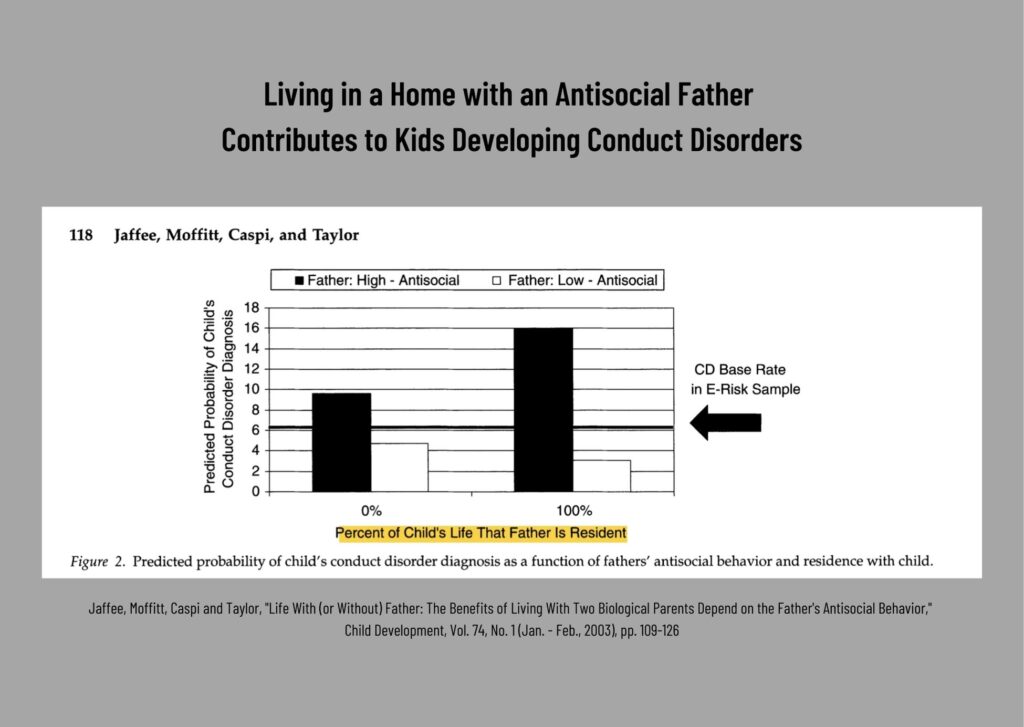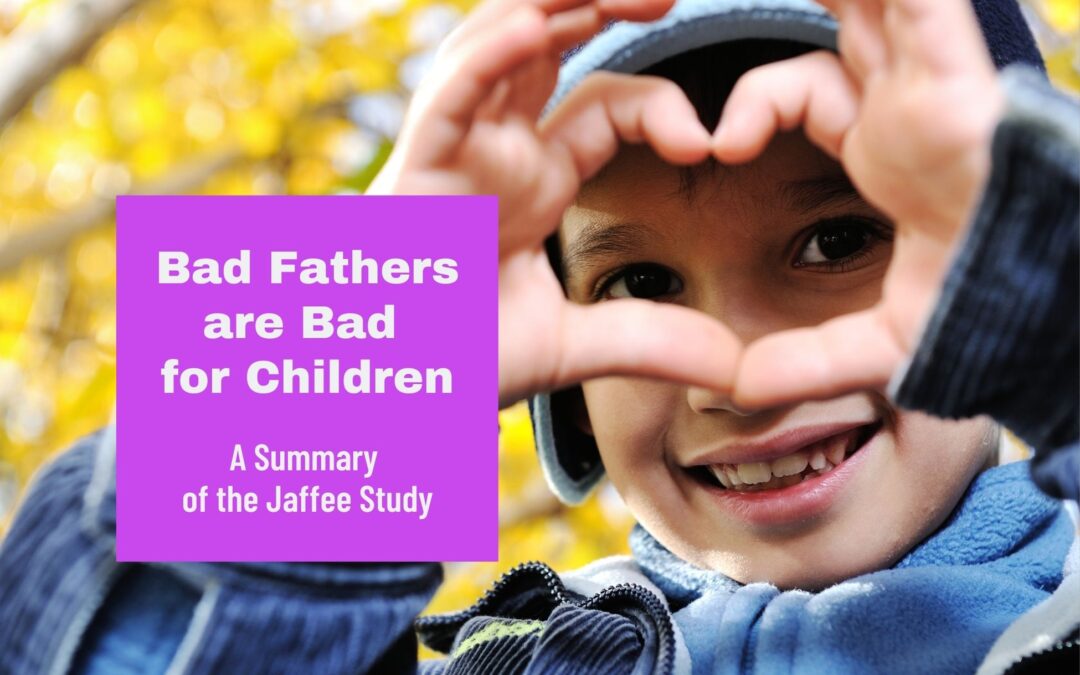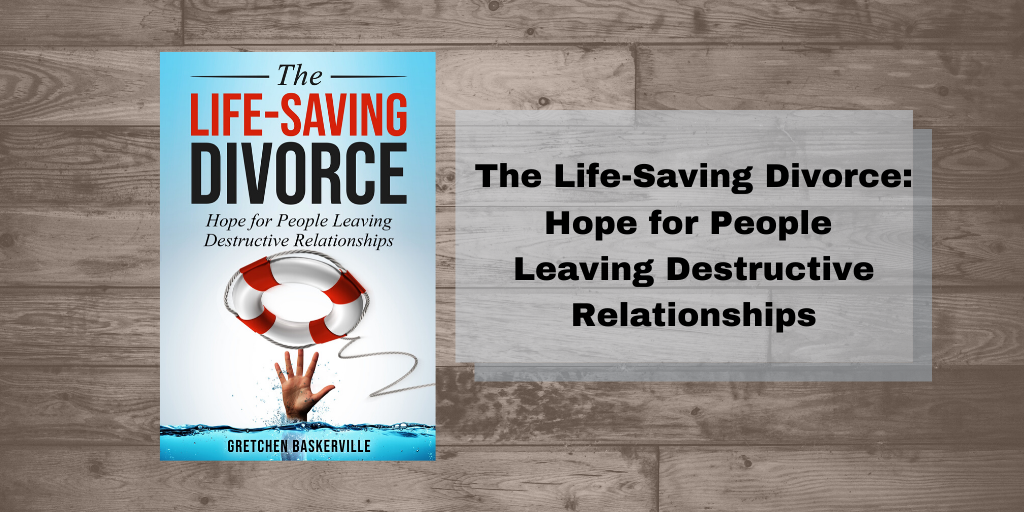Bad Fathers are Bad for Children: A Summary of the Jaffee Study
This is a summary of the highlights of the Jaffee Study—for marital abuse victims who are weighing options: To stay or to divorce.
Bad fathers are bad for kids.
Good fathers are good for kids.
There is a belief that children need two married biological parents in the home to turn out well. And supporters of this belief may even say that children need a father—any father—in the home, meaning that any two-parent married home is always better than a single parent home.
But that’s not true. A lot depends on how emotionally healthy or destructive each parent is. A good father is wonderful for kids. But a bad father is not, in fact, he’s destructive.
Here’s a summary of the Jaffee study, which found the advantages of growing up in a two-parent family may be negated when one or both parents have a “history of antisocial behavior.” In other words, bad fathers are bad for children. A bad father cancels the positive effect of a two-parent married family.
The Jaffee study found that when fathers engaged in high levels of antisocial behavior (see below for the list of examples), the more time they lived with their children, the more conduct problems their children had. Their children’s behavior problems were far worse than other kids’ of the same age. (See graph below.)
In the study of 1,116 families with children who were twins, about 15% of the fathers had three of more of the antisocial traits listed below.
About 1 in 8 kids living with those antisocial fathers developed serious conduct disorders themselves. Some became predatory too (lying, cheating, physically attacking others, and/or using force to take things from other children). Fathers who had antisocial behavior and resided with their children predicted the kids’ chances of conduct disorders.
The character disorders of a destructive father might also contribute to such issues as poverty, child or wife abuse, drugs/alcohol use, and harsh discipline and coercion.
If the father did not have any antisocial traits, then the likelihood of having a child with serious conduct orders was only about 1 in 33 kids. In fact, the more time that good fathers resided with their children, the lower the likelihood of conduct disorders.
(Antisocial mothers were found to be a problem too, but that wasn’t the focus of the Jaffee 2003 study.)
What character issues did these antisocial fathers have? (They had at least 3 of these to be considered “antisocial” for the purpose of the study.)
(1) Failed to conform to societal norms: example, engaged in criminal behavior or ever been in jail or prison.
(2) Deceitful: example, lies to partner; tells lies to others and tricks people into giving him things or doing what he wants.
(3) Impulsive or acts without thinking.
(4) Irritable or aggressive: example, gets into many fights.
(5) Reckless disregard for safety of self or others: examples, risky behavior or drug/alcohol use that has caused injuries, accidents, and health problems.
(6) Consistently irresponsible: example, fails to pay debts or meet other financial responsibility.
(7) Lack of remorse: example, doesn’t seem to feel guilt for misbehavior.
Researchers found that having married parents didn’t solve the problem of the children's antisocial behavior. Merely having two married parents isn’t protective when the father is destructive. And merely getting married doesn't improve antisocial men's behavior.
The graph below shows that when children resided with an antisocial father full time, they were more likely to be diagnosed with conduct disorders themselves. The less time the children spent residing with their father (for example, half of the time), the less likely they were to be diagnosed with conduct disorders.

Source:
Jaffee, Moffat, Caspi, Taylor, "Life with (Or without) Father: The Benefits of Living with Two Biological Parents Depend on the Father's Antisocial Behavior," Child Development, Vol. 74, No. 1 (Jan. - Feb., 2003), pp. 109-126 (LINK)
Are you considering a life-saving divorce and need support and clarity? I’d like to invite you to my private Facebook group, "Life-Saving Divorce for Separated or Divorced Christians." Just click the link and ANSWER the 4 QUESTIONS. This is a group for women and men of faith who have walked this path, or are considering it. Supporters and people helpers are also welcome. I’ve written a book about spiritual abuse and divorce for Christians, The Life-Saving Divorce: Paperback: https://amzn.to/3cF1j25 Or eBook: https://amzn.to/3CCBsnr
Also, sign up for my email list below or HERE
MOST POPULAR BLOG POSTS
Start Here
- What is a Life-Saving Divorce? How Do We Know Half of Divorces are “Life-Saving”? (or watch the video)
- Life-Saving Divorce: Introduction What Is this Book About? (audio and transcript)
- About Me: Why Is a Nice Christian Girl Like Me Promoting Divorce?
- How Can I Get the Book, The Life-Saving Divorce? (Amazon affiliate link.) — FREE study guides for each chapter. — FREE videos for each chapter.
Does God Hate Divorce? God Gave Divorce Due to Hardhearted Abusers & Betrayers
- Myth: Divorce is the Unpardonable Sin and "God Hates Divorce"
- Abuse is Biblical Grounds for Divorce
- Malachi 2:16 Haven’t Our English Bibles Always Said, “God hates divorce”? No.
- ”But He Never Hit Me”: Divorce for Neglect, Emotional, and Financial Abuse
Physical and Emotional Abuse & Infidelity
- 130 Examples of Abuse: Emotional, Physical, Financial, Spiritual and Gaslighting
- Pastors Who Accept Physical and Emotional Abuse as Grounds for Divorce
- Severe Emotional Neglect: Toni’s Story of Finding Freedom (video)
- 40 Years of Murderous Rages and How I Got Free! Karen’s story (video)
- How Churches Should Handle Abuse Victims (video with Pastor Neil Schori)
- Help! I’m Married to a Cheater: Should I Stay or Go?
- Married to a Pedophile: How I Got Out – Pam’s Story (video)
- Help! I Am Alone with the Abuser
God Allows Divorce to Protect Victims
- Jesus' Greatest Divorce Sermon - Luke 13 (or watch the Video)
- Pastors Who Accept Physical and Emotional Abuse as Grounds for Divorce
- Myth: The Person Who Files for Divorce Caused the Divorce
- Haven’t Our English Bibles Always Said, “God hates divorce”? No.
- Jesus Said, "Love My Enemy"—Can I Still Divorce Them?
- But I Thought it Was God's Will for Me to Marry this Person!
- Is Pointing Out Marriage-Endangering Sin Being Judgmental? (video)
- One Woman's Story: Adultery, Prayer and the Bible
- Is Marriage an Unconditional Covenant or a Conditional One? (Video)
- Does Divorce Shatter the Image of Christ and the Church as John Piper Suggests?
- Divorce and the Good Samaritan Story
- Myth: Divorce is the Unpardonable Sin and "God Hates Divorce"
- Myth: Your Divorce Will Shatter the Image of Christ and the Church
- Myth: You Must Forgive and Forget Over and Over, Forever
How to Find a Good Supportive Church
- Pastors Who Accept Physical and Emotional Abuse as Grounds for Divorce
- 7 Ways to Know if a Church is Safe for Abused Wives (or Abused Husbands)
- Do My Pastors Have a Say about Me Getting a Divorce?
- Good vs. Bad Pastoral Counselors on the Topic of Marital Abuse: 40 People Tell their Stories
What If My Pastor Says It Would Be Wrong to Get Divorced for Abuse?
- 5 Bible Verses that Say You Should Separate from an Abuser
- 1 Million God-honoring Divorcees Cannot Find a Good Church
- Church Denominations and Divorce Policies Comparison Chart
- Excommunication for Getting Divorced? What to Do!
- Evangelicals Shooting their Own Wounded Divorcees (video) or blog/transcript
- How to Handle Criticism When You Divorce (video-3 parts) Natalie Hoffman, Gina Kaye
- Myth: You Don't Take God-Ordained Marriage Seriously
- Sermon Ideas for Domestic Violence Awareness Month - October
- Churches That Block Abused Wives (and Husbands) From Divorcing
- Southern Baptists make Evangelicalism Unsafe for Abused Wives & Husbands
- How Churches Should Handle Abuse Victims (video with Pastor Neil Schori)
- List of Every Known Puritan Divorce in Massachusetts between 1639 and 1692.
Divorce Saves Lives: The Surprising (Wonderful!) Truth About Divorce Nobody Told You
- Your Kids Will Likely Be Fine After Divorce (Nearly 8 in 10 Are!)
- 10 Facts Evangelical Pastors MUST Know about Kids and Divorce [VIDEO]
- There Is No Divorce Crisis. We have a Sin Crisis.
- Myth: 95% of Divorces are for Falling Out of Love
Will I Ever Find Love Again? Dating After Divorce: Good News
- Will I Ever Find Love Again?
- Dating after Divorce: An interview with Gina Kaye
- I Fear I'll Never Find a Healthy Relationship
- Remarriage after Divorce: How Can I Claim to be the Innocent Spouse? I Had My Faults Too!
Finding Happiness and Health After Divorce
- Will the Kids and I Ever Be Happy Again?
- Happiness Either Way: Remarriage or Staying Single
- Divorce May Improve Your Health: Depression, Suicidal Thoughts and Medical Issues
- How My Health Improved Dramatically After Divorce: Karen’s Story (video)
- “I’m Off of All My Depression Medications Now That I’ve Divorced” Schari’s story (video)
- PTSD, EMDR and My Major Health Improvements after Divorce Toni’s story (video)
Thriving After Divorce: These Christians Tell their Stories
- Christians Finding Peace after Divorce: Shirley Fessel, Author (Audio) or (Video)
- 10 Turning Points: Stories of How Others Decided to Stay or to Go
- Married to a Pedophile: How My Kids and I Got Free! (video)
- Finding Joy after a 40-Year Abusive Marriage (video)
- Can I Divorce My Mentally Ill, Destructive Spouse? Yes! Amanda’s Story (video)
- From Bondage to Glorifying God! 5 Survivor Stories (after 20-, 30-, 40-year long abusive marriages)
Self-Doubt, Second-Guessing Ourselves, and Gaslighting
- Am I the One Destroying the Relationship?
- How Can I Call Myself the Innocent Spouse? I Wasn’t Perfect Either (video)
- Is Pointing Out Marriage-Endangering Sin Being Judgmental? (video)
- Myth: He Wouldn't Cheat or Watch Porn if You Gave Him More Sex
- Myth: You're Lying: We'd All Know If Your Spouse Was That Bad
- Myth: It Takes "Two to Tango" and "All Marriage Problems are 50/50"
- How to Handle Criticism When You Divorce (video-3 parts) Natalie Hoffman, Gina Kaye
Children and Divorce: Researchers Give Hope
- Is it Best to “Stay for the Kids”? Sometimes, yes. But Not if It’s a Toxic Marriage
- Researchers Know Your Kids Will Likely Be Fine After Life-Saving Divorce
- 5 Studies That Say Your Kids are Likely to Be Okay After Divorce (video)
- Marriage Does Not Guarantee Good Kids: 1 in 10 Kids from Married Two-Parent Homes are Troubled.
- Myth 21: Divorce will Destroy Your Children, So Stay for the Sake of Your Kids
High Conflict Divorce and Parenting
- Research shows: Your Kids Will Likely Be Fine After Divorce: In Fact It’s Best to Divorce to Get Away From Abuse
- 12 Ways to Document and Protect Yourself in a High-Conflict Divorce
- 12 Tips for Talking with Angry, Alienated Kids
- Myth: Divorce will Destroy Your Children, So Stay for the Sake of Your Kids
Recommended Reading List and Free Resources for Christians and Other People of Faith
Common Myths
- Myth: Your Marriage Would Be Great if You Just Submitted More
- Myth: Divorce will Destroy Your Children, So Stay for the Sake of Your Kids
- Myth: Divorce is the Unpardonable Sin and "God Hates Divorce"
- Myth: You Just Didn't Try Hard Enough
- Myth: You Don't Take God-Ordained Marriage Seriously
- Myth: Your Divorce Will Shatter the Image of Christ and the Church
- Myth: You Must Forgive and Forget Over and Over, Forever
- Myth: 95% of Divorces are for Falling Out of Love
- 27 Myths about Divorce That Probably Don't Apply to Committed Christians
FREE
- Download “7 Effective Ways to End the Stigma of Divorce in the Church” (Sign up)
- Download “7 Effective Ways to Deal with Criticism when You Divorce” (Sign up)
- Download “3 Studies that Show Kids Are Most Likely to Turn Out Fine After Divorce” (Sign up at bottom of page)
FOLLOW
- Home Follow me on Facebook • Follow me on Twitter • Buy the book.
- 10 Key Highlights from the The Life-Saving Divorcebook: 10-minute video overview OR 10 Key highlights blog post
- Request to Join the Life-Saving Divorce Private Facebook Group (Don’t forget to answer the 4 questions)
- Subscribe (FREE) to my You Tube Channel
- About Me Contact
- Gretchen’s Life-Saving Divorce Interviews in the Media
GET THE BOOK! The Life-Saving Divorce is about divorces for very serious reasons: a pattern of sexual immorality, physical abuse, chronic emotional abuse, life-altering addictions, abandonment, or severe neglect. This book will give you hope for your future, and optimism about your children. As an Amazon Associate I earn from qualifying purchases.


